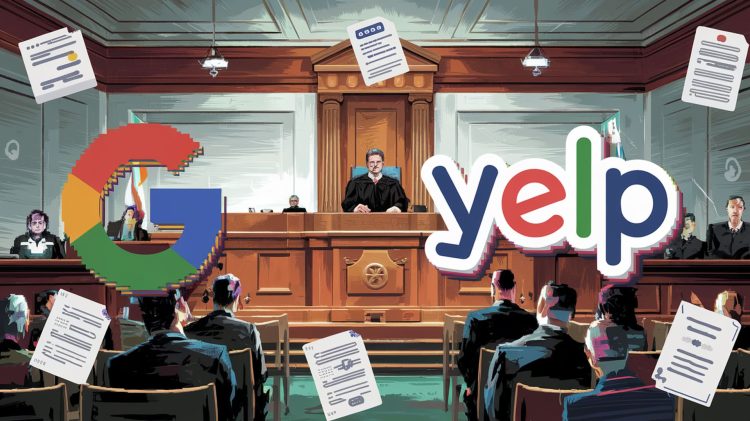The tech world has been buzzing with the ongoing Google-Yelp lawsuit, a clash that could potentially reshape the landscape of online search and review platforms. Yelp, a popular review platform, has accused Google of abusing its dominant position as the world’s leading search engine to unfairly promote its own services and stifle competition.
The heart of the Google-Yelp lawsuit
At the core of the Google-Yelp lawsuit is a series of allegations made by Yelp against Google. Yelp contends that Google has used its market power to:
- Manipulate search results: Yelp claims that Google intentionally prioritizes its own services, such as Google Maps and Google Reviews, in search results, even when they are not the most relevant or helpful. This, Yelp argues, limits user exposure to alternative platforms like Yelp.
- Create barriers to entry: Yelp contends that Google has established barriers to entry for competitors by forming exclusive deals with mobile device manufacturers and internet service providers. This gives Google a significant advantage over rivals.
- Engage in anti-competitive practices: Yelp also accuses Google of engaging in anti-competitive practices, such as “poaching” Yelp employees and attempting to undermine Yelp’s reputation.
Implications for consumers
If Yelp’s allegations are proven true, the implications for consumers could be significant. A dominant Google could potentially limit consumer choice and reduce competition, leading to higher prices and lower-quality services. For instance, if Google were to prioritize its own services over those of competitors, it could make it more difficult for consumers to find the best deals on products and services.

The broader context
The Google-Yelp lawsuit is part of a larger trend of increased scrutiny on tech giants and their market power. Governments and regulators around the world are examining the potential anti-competitive practices of these companies and considering new regulations to address concerns about market dominance. This increased scrutiny is driven by a growing concern that tech giants may have too much power over the way we access and consume information.
The future of the case
The outcome of the Google-Yelp lawsuit remains uncertain. The case is complex, and there are strong arguments on both sides. However, the outcome could have far-reaching implications for the future of the internet and the balance of power among tech companies. If Yelp were to win the case, it could set a precedent that would encourage other companies to challenge the dominance of tech giants.
Key Arguments in the Case
- Yelp’s Argument: Yelp argues that Google has used its dominant position in the search engine market to unfairly promote its own services and harm competitors like Yelp. Yelp claims that Google has manipulated search results, created barriers to entry, and engaged in anti-competitive practices.
- Google’s Argument: Google has denied Yelp’s allegations, claiming that its search results are based on algorithms that are designed to provide users with the most relevant and helpful information. Google has also argued that it has not engaged in any anti-competitive practices.
The potential impact of the case
If Yelp were to win the case, it could have a significant impact on the tech industry. It could lead to increased regulation of tech giants and could force Google to change its business practices. The case could also have a positive impact on consumers by increasing competition and reducing Google’s dominance.
The Google-Yelp lawsuit has also drawn the attention of regulators around the world. Governments and regulatory bodies are closely watching the case and may take action if they believe that Google has engaged in anti-competitive behavior.

The Google-Yelp lawsuit is a landmark case that could have a profound impact on the future of the internet. The outcome of the case will likely shape the way that tech giants are regulated and the way that consumers access information online. As the case continues to unfold, it will be interesting to see how the court rules and what the implications will be for the tech industry as a whole.
Additional considerations
- The role of consumers: Consumers can also play a role in influencing the outcome of the Google-Yelp lawsuit. By being aware of the issues at stake and by supporting companies that are committed to fair competition, consumers can help to ensure that the internet remains a level playing field.
- The impact on innovation: Some argue that the dominance of tech giants like Google can actually promote innovation. By having a large market share, these companies can invest heavily in research and development, which can lead to new products and services. However, others argue that too much dominance can stifle innovation by discouraging competition.
- The future of the internet: The outcome of the Google-Yelp lawsuit could have a significant impact on the future of the internet. If Google is found to have engaged in anti-competitive behavior, it could lead to a more fragmented internet with more competition among search engines and other online platforms.
The Google-Yelp lawsuit is a complex case with far-reaching implications. As the case continues to unfold, it will be interesting to see how the court rules and what the consequences will be for the tech industry and consumers alike.
Featured image credit: Emre Çıtak/Ideogram AI





